-
Ad blockers are the best protection against disruptive ads.
-
Some of the best ad blockers are NordVPN Threat Protection, Proton VPN Net Shield, and Surfshark.
-
Paid ad blockers like NordVPN Threat Protection are more reliable than the free ones, because they offer multiple security features, like a VPN.

If you have spent time online, waiting for a few seconds to skip an ad is one of your least favorite things. While ads seem harmless, they can be frustrating to deal with, so it’s perfectly normal to want to find a way out.
If you want a suitable solution to these marketing inconveniences, you’re probably curious about ad blockers. Thankfully, we have done the research, so you don’t have to. This guide contains 12 best ad blockers that prevent pop-up ads from ruining your internet experience.
Best ad blockers in 2026: Quick list

- NordVPN Threat Protection: Free ad blocker for users on both iOS and Android.
- Proton VPN Net Shield: Provides users with up to 1 month free Ad block.
- Surfshark Cleanweb: Allows new users with free ad block trials for both iOS and Android.
- Total Adblock: Offer users with a unique adblock experience.
- AdBlock: Provides a simple user interface and a free extension.
- Ghostery Ad Blocker: Perfect ad blocker for desktop devices.
- AdGuard: Unique and user-friendly interface.
- Adblock plus: Grants complete control for every website and webpage.
- Avast Secure Browser: Delivers a comprehensive built-in ad blocking experience.
- Malwarebytes Browser Guard: Effective browser extension for blocking ads.
- uBlock Origin: Easy to configure and effective for removal of pop-ups.
- AdLock: Most useful in blocking ads on social media.
How to use an ad-blocker?
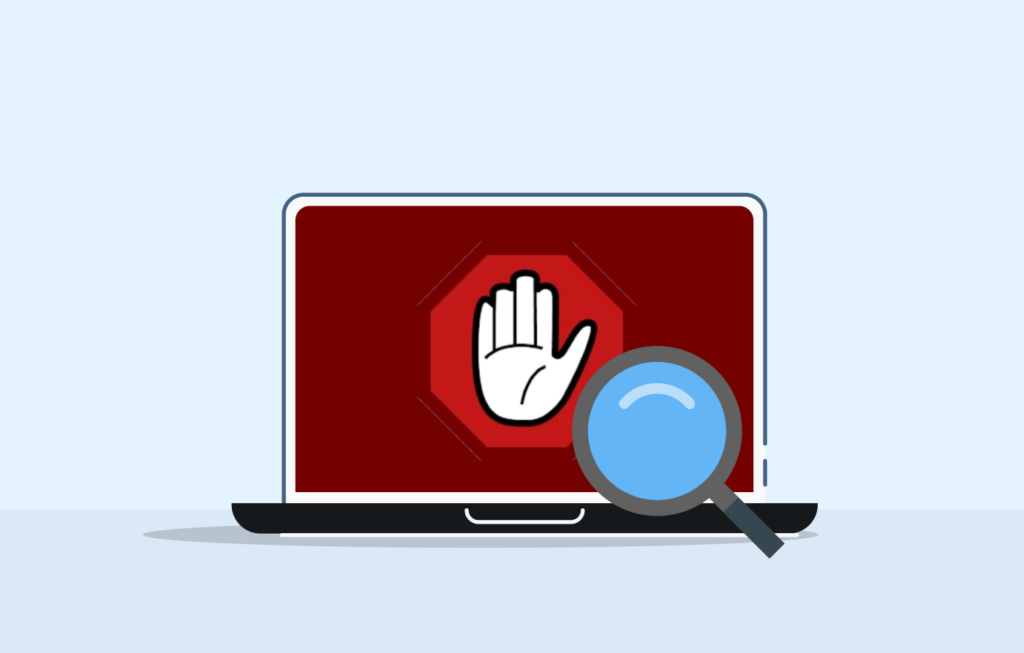
Ad blockers work by running interference between you and the website you’re visiting. They are known to modify websites and intercept those ads that may pop up during your visit. Here’s a step-by-step guide on how to use an ad blocker:
- Download and install an adblocker extension or its application from its website. We recommend using NordVPN because of its robust features.
- Configure the ad blocker by adjusting its settings to block specific ads, allow websites, and create exceptions.
- To start blocking ads, enable the ad blocker in your browser or device settings.
- Check your browser to see if ads are being effectively restricted by visiting websites with ads and ensuring that they are no longer displayed.
- Monitor and update your ad blocker to ensure it has the newest features and protects against new ad types.
12 Best ad-blockers to use in 2026: Quick Comparison
| Ad Blocker | Price | Free version | Passed ad blocking tests | YouTube ad blocking | Streaming services | Apps | Chrome extension | Browsers | Other Features |
|---|---|---|---|---|---|---|---|---|---|
| NordVPN Threat Protection | $3.99 | Yes, 7-day free trial | Yes | Yes | YouTube, Amazon Prime Video, Hulu, ESPN+, Paramount Plus | Android, iOS, Windows, Linux, macOS | Yes | Firefox, Chrome, Safari, Opera, Brave, Edge | VPN |
| Proton VPN Net Shield | $4.99 | No, only the VPN offers a free version | Yes | Yes | Amazon Prime Video, Hulu, Disney+, Paramount Plus, ESPN+ | iOS, Android, macOS, Linux, Windows | Yes | Firefox, Chrome, Safari, Opera, Brave, Edge | VPN |
| Surfshark Cleanweb | $2.19 | Yes, 7-day free trial | Yes | Yes | Netflix, Amazon Prime Video, Disney+, Paramount Plus, Hulu | iOS, Android, Windows, macOS, Linux, FireTV | Yes | Chrome, Firefox, Edge, Safari | VPN or VPN and antivirus bundle |
| Total Adblock | $1.59 | Yes, 7-day free trial | Yes | Yes | YouTube, Paramount Plus, Hulu, Amazon Prime Video, Twitch | iOS, Android | Yes | Safari, Chrome, Opera, Firefox, Edge | Antivirus or stand alone |
| AdBlock | Free | Free | Yes | Yes | Twitch | iOS, Android | Yes | Chrome, Firefox, Safari, Edge | Stand alone |
| Ghostery Ad Blocker | Free | Yes | Yes | Yes | Hulu, Amazon Prime Video, Paramount Plus, ESPN+, Disney+ | macOS, Windows | Yes | Chrome, Safari, Firefox, Edge | Stand alone |
| AdGuard | $2.49 | Yes | Yes | Yes | Netflix, Disney+, Amazon Prime Video, HBO Max, Hulu | Windows, macOS, iOS, Android, Linux | Yes | Chrome, Firefox, Safari, Edge | Parental control, local VPN |
| Adblock plus | Free | Yes | Yes | Yes | Netflix, Hulu, Disney+, Amazon Prime Video | Android, iOS, Windows, macOS, Linux | Yes | Firefox, Chrome, Safari, Edge, Opera | Stand alone |
| Avast Secure Browser | $4.58 | Yes | Yes | Yes | Netflix, Hulu, Amazon Prime Video, Paramount Plus, Disney+ | Windows, iOS, Android | No | – | Private browser |
| Malwarebytes Browser Guard | Free | Yes | Yes | No | Paramount Plus, Hulu,Disney+, Amazon Prime Video, ESPN+ | macOS, Windows, Android | Yes | Chrome, Firefox, Edge | Antivirus |
| uBlock Origin | Free | Yes | Yes | Yes | Netflix, Disney+, Hulu, Amazon Prime Video | Windows, Mac, Linux, Android, iOS | Yes | Chrome, Safari, Firefox, Edge, Opera, | Stand alone |
| AdLock | $0.73 | Yes, 14-day free trial | Yes | Yes | Hulu, YouTube, Paramount Plus, Twitch, Amazon Prime Video, | macOS, iOS, Android, Windows | Safari, Firefox, Chrome, Edge | Stand alone |
Best ad-blockers to block ads and pop-ups – Detailed list

1. NordVPN Threat Protection
NordVPN Threat Protection is more than just an adblocker because it offers users a wide range of features. Apart from just preventing intrusive ads from displaying on websites, this platform also masks your browsing data and offers you adequate threat protection against phishing attacks and malware.
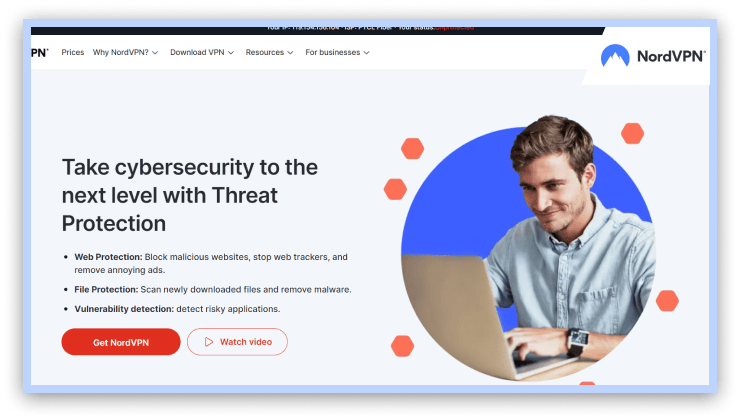
With this ad blocker, you can get rid of malicious content, including pop-ups, banners, trackers, and even autoplay video ads. It also features URL trimming to remove tracking data from website links. In addition, it prevents access to harmful sites and generates a weekly summary to evaluate its effectiveness.
Pros
- Equipped with a VPN
- Blocks most types of ads
- Access to complete services for a 7 day free trial period
- Features URL trimming
- Protects sensitive data and IP address
Cons
- Users can only access the lite version on iOS and Android
- Does not include the option to allowlist
2. Proton VPN NetShield
Proton VPN Netshield is an excellent ad blocker that offers three levels of protection to block ads, malware, and trackers. It features the Netshield privacy panel that allows users to monitor the number of malware, trackers, and ads it has blocked. Users are given the option to turn off the additional malware protection without disabling the ad-blocking feature.
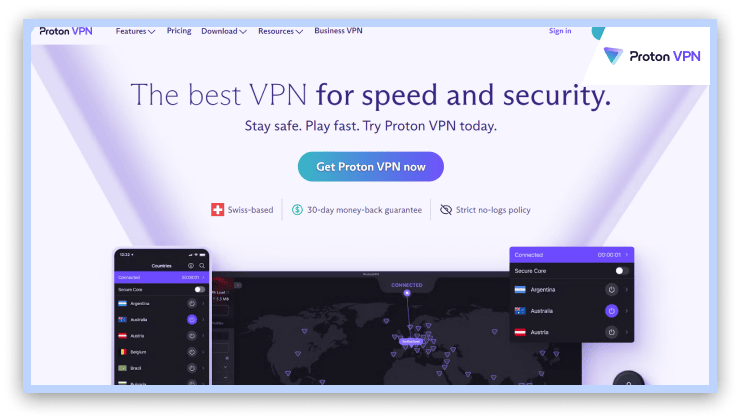
This ad blocker performed well on our tests, making it a good option, especially with its ultra-fast filtering and ad blocking. As a result of this, websites modified by NetShield load faster and require less data consumption.
Pros
- Provides effective ad blocking against stubborn ads
- Extra protection with VPN feature
- Provides 30 day money back guarantee
- Customizable settings
Cons
- Does not support a browser extension
3. Surfshark Cleanweb
Surfshark CleanWeb is a flexible ad blocker for improving online experiences across a range of activities. It protects your website from attacks, but also notifies you even before the threat becomes imminent, especially on streaming platforms. With Surfshark, you are guaranteed faster page load time protection against cookie pop-ups, banners, and trackers.
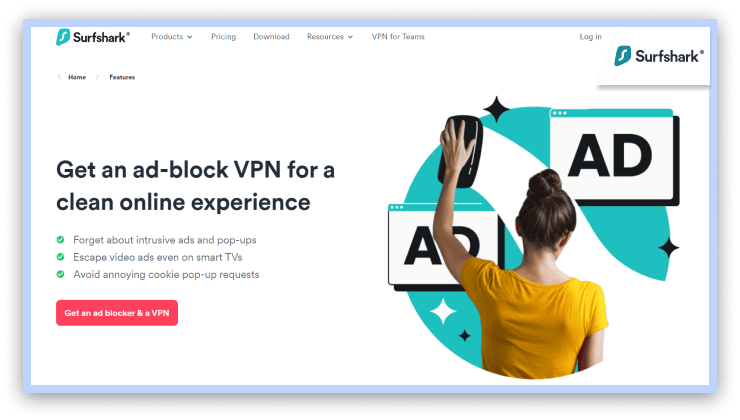
It has a user-friendly interface, and it is compatible with different devices and browsers. Surfshark CleanWeb also features a private search engine that provides accurate search results.
Pros
- Compatible with a wide range of devices
- Features a private search engine
- Includes allowlisting feature
- Notifies you if there is a website breach
- High adblock test result
Cons
- App versions do not effectively block ads
- Does not block cookie pop-ups
4. Total Adblock
When it comes to ad blocking, Total Adblock is a real gem. It allows users to include a list of websites that can display ads freely without any form of regulation. You can also monitor the number of ads that have been successfully blocked and the platform’s overall performance from the control panel. Additionally, the paid version supports an antivirus and other advanced filters like social media blocking and tracking protection.
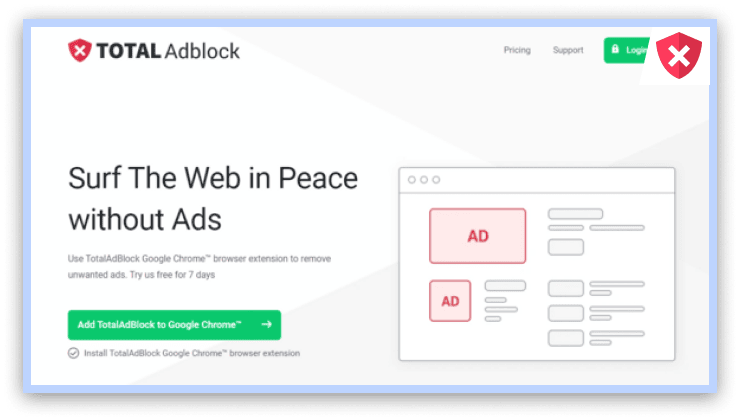
If you use either an iOS or Android device, you have seamless access to the many features of this ad blocker, including its ability to block ads and third-party trackers. You can also access Total Adblock on your desktop or macOS computer via a browser extension.
Pros
- Cost effective
- User-friendly and easy to set up
- Includes a white listing feature
- Quick and efficient website filtering
Cons
- Only available for iOS and Android operating systems
5. AdBlock
AdBlock is an easy-to-use ad blocker that comes in the form of an extension. With its simple interface, users can easily navigate its settings and block ads effectively. It also offers the option to pause the extension on any website you visit, especially if the site won’t allow you access it if it’s activated.
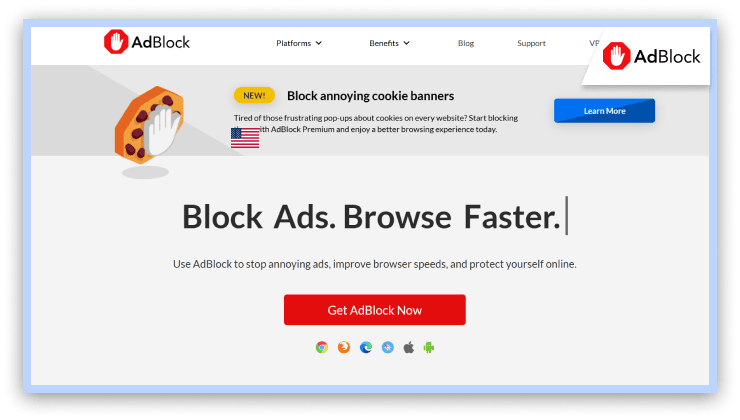
This tool is effective at blocking pop-ups, trackers, and even floating videos. However, a major drawback is that this extension allows acceptable ads by default.
Pros
- User-friendly interface
- Successfully blocks trackers, pop-ups, and ads
Cons
- Allows acceptable ads by default
6. Ghostery Ad Blocker
With Ghostery, you get completely free privacy browsing and ad-blocking software. This simple tool also blocks trackers, cookies, and other pop-ups to give you an uninterrupted internet experience. It also allows you to customize tracker blocking, and its Never Consent feature removes any requests to accept cookies. Moreso, you get an in-depth analysis of the sites you visit.
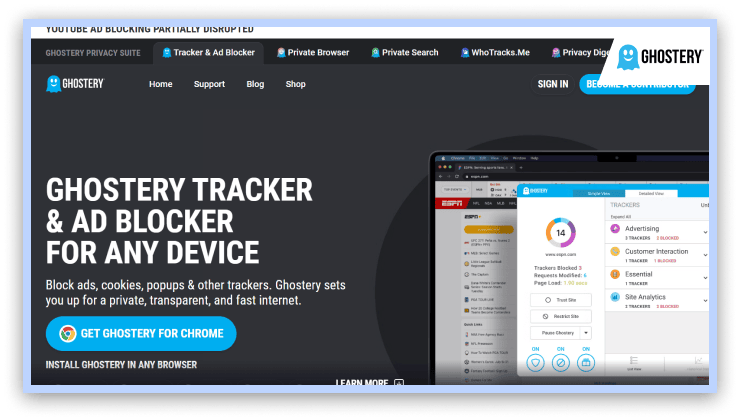
Pros
- Features white listing
- Blocks cookie requests
- Great adblocking results
- Free version offers most features
- Works effectively with Firefox and Chrome
Cons
- Not supported on mobile devices
- Does not sync settings across devices
7. AdGuard
Not many browser based ad blockers were able to score high in our test, but AdGuard stands out. This software is easy to download and features a user-friendly interface. It blocks all YouTube ads and features options to customize our settings. Additionally, it has a Stealth Mode feature that allows users to browse the internet safely.
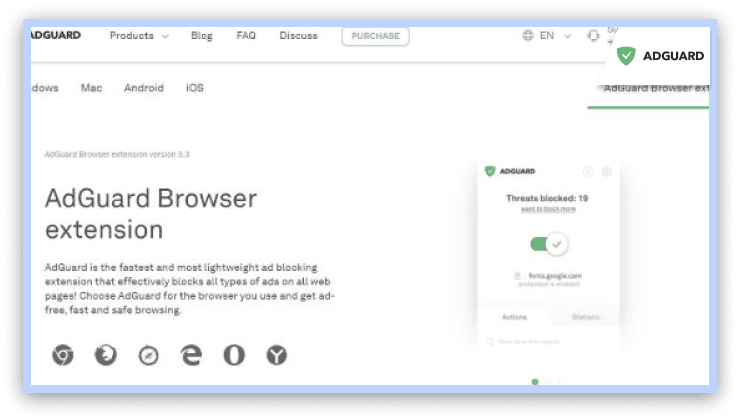
Another useful feature of AdGuard is blocking adult sites to protect children. This ad blocker is effective against trackers, malware, social widgets, and other ads.
Pros
- User-friendly interface
- Open-source software
- Does not interfere with device speed
- Offers parental control features
Cons
- Unclear ad-blocking stats
8. Adblock plus
If you want an excellent ad blocker that does not require you to pay a fee but still offers you useful features similar to paid tools, use Adblock Plus. The most striking feature of Adblock Plus is that it is an open-source tool, making it accessible to the general public to scrutinize before recommending changes. It is effective against YouTube ads, social media trackers, and push notifications.
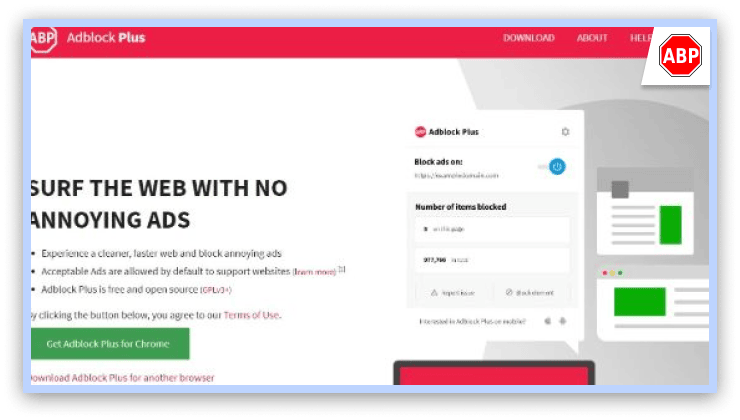
Adblock Plus features a simple and easy-to-use interface with easy disable options. This tool lets you see an overview of the ads you have blocked on a specific page and the overall sum. In addition, it is a free adblokcer that you can use if you are on a budget. However, if you want some additional features, you can subscribe to its premium plan.
Pros
- Free version adblocker
- Offers swift customer support via email
- Includes a language filter in ads removal
- Equipped with customizable settings
Cons
- Allows acceptable ads by default
9. Avast Secure Browser
Avast Secure Browser has a lot of features for blocking ads. Its Privacy Guard feature removes social media, video, and banner ads, including trackers and browser fingerprints. You can also choose the ad blocking setting, from basic to balanced or strict, and it includes white listing.
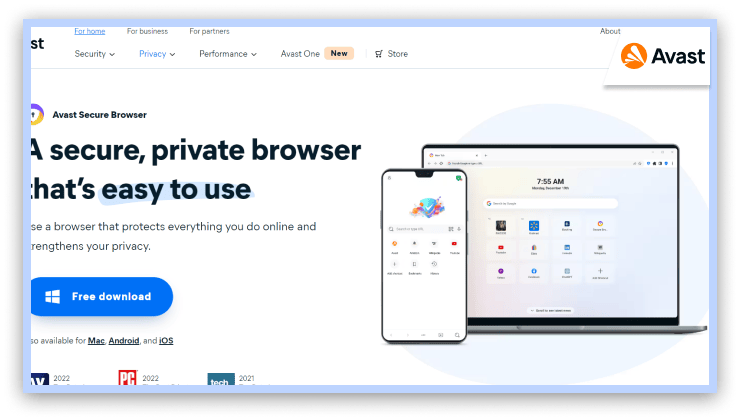
With the pro version of Avast Antivirus, you get a built-in VPN capability for information privacy and increased security on public Wi-Fi. This ad blocker is compatible with various devices and while the free version is effective, you get more features with the pro version.
Pros
- Great adblocking results
- Features a private browser in addition to an adblocker
- Offers allowlist feature
Cons
- Only works with Avast secure browser
10. Malwarebytes Browser Guard
Malwarebytes Browser Guard is a free ad blocker extension. Aside from ads and pop-ups, it prevents cryptocurrency mining, fraud, and other third-party trackers. This tool claims to quicken website loading. You can download it for free or with Malwarebytes antivirus.
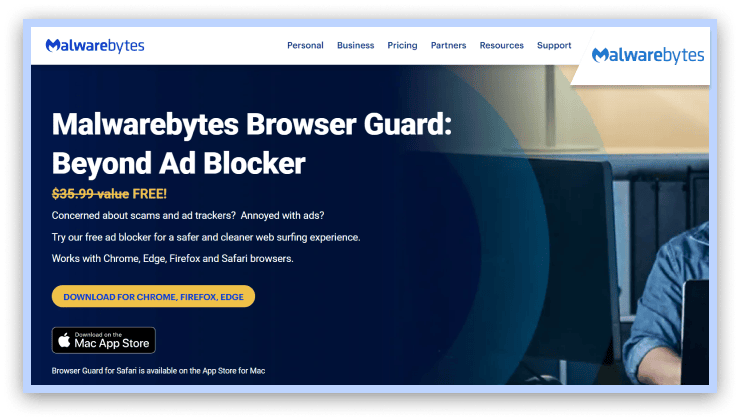
It protects your device from harmful sites and even features Advanced Skimmer Protection that secures your bank card details at checkout pages. Additionally, with its allowlisting feature, you can disable or enable malware, scam, tracker, and ad blocking.
Pros
- Allowlisting is customizable
- Excellent at blocking ads
- Blocks phishing sites
Cons
- Does not block YouTube ads
11. uBlock Origin
There are not many free ad blockers that are capable of completely blocking YouTube video ads like uBlock Origin. This tool effectively removes annoying mastheads, sidebar ads, and trackers. It also allows users to dictate how their browser handles content from third parties, ensuring a more efficient browsing experience.
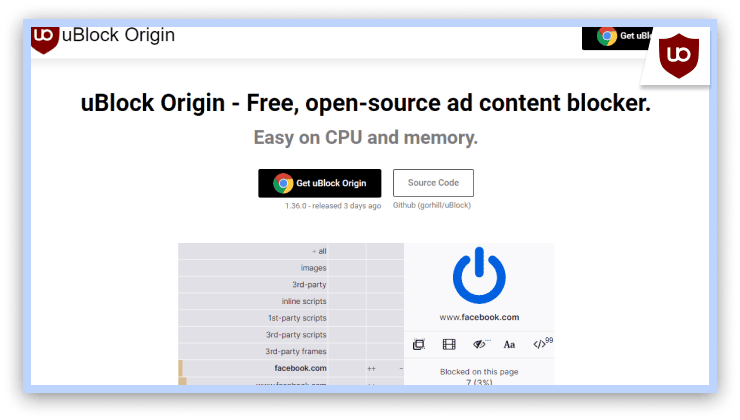
uBlock Origin works well with various web browsers while filtering and blocking other content like anti-blockers and coin miners. Additionally, this tool offers custom content filters with filter lists so you can block specific media.
Pros
- Effective when blocking ads
- Prevents browser fingerprinting
- Open-source software with options for customization
Cons
- Not beginner-friendly
12. AdLock
Not many social media users are aware of the fact that many web pages and blogs connected to their social media can be easily tracked and monitored. This is where AdLock functions effectively by preventing web pages from tracking your activity while also removing pop-up ads. Users also have the option to edit the websites that should be left unfiltered.
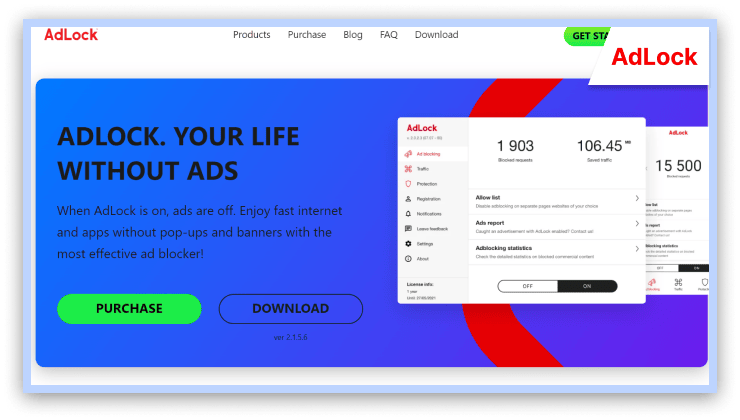
With Adlock’s Safebrowsing feature, users can avoid unsafe websites, using Google’s Safe Browsing service. It also notifies you of a malicious site before you access it. You can use AdLock on 5 devices per subscription to block banners, pop-ups, crypto miners, video ads, and trackers.
Pros
- Effective ad blocking feature
- Includes a allowlist feature
- Free plan blocks most ads and trackers
- Offers options for customization
- Does not give third parties access to your data
Cons
- Limited payment options
How we chose and tested these ad blockers?
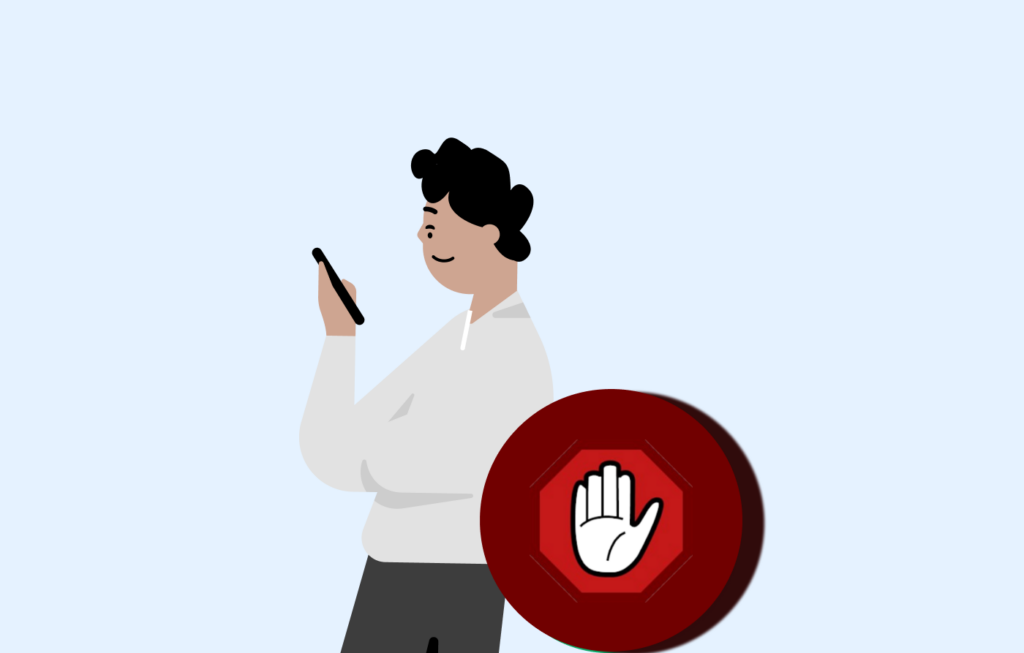
Before labeling an ad blocker as effective and great for solving all your adblocking needs, it must excel in several areas, including security, interface, and compatibility, among other functions. For this reason, we carefully researched and tested each of these adblockers to ensure they’re worth using. Follow our lead and make sure your ad blocker has these features:
- Effectiveness in blocking ads: A reliable ad blocker blocks a long list of ads, including GIFs, pop-ups, widgets, mastheads, and banners.
- Ability to customize to preferred settings: Always look for ad-blockers that allow you to use your preferred settings.
- Periodic scheduled app updates: As more websites get clever with trying to sneak ads past modern ad blockers, your tool must receive periodic updates that will keep them up-to-date with the recent trends, thereby guaranteeing a stronger defense.
- Compatibility with mobile devices: Adblocker must be 100% compatible with your device to get the best out of it.
- Pricing: Affordable prices are a staple among ad blockers. And so, we listed several ad blockers that will not burn a hole in your pocket. Their prices are relatively cheap when you consider the value they offer.
Why is an ad blocker necessary?

People use ad blockers primarily for privacy and security on the internet. Some other reasons for using an ad blocker include:
- To block targeted ads: It is common for trackers to monitor your browsing history and behavior to enable companies to produce tailored adverts for you. However, a reliable ad blocker ensures that your data is not tracked anytime you use the internet.
- To avoid content disruptions: When a website is cluttered with ads, it makes it impossible to view the web content. An ad blocker is effective in removing ads so you can browse freely on any site.
- To guard against malvertising: This refers to malicious ads that can infect your device with security threats like spyware and malware. Thankfully, an ad blocker effectively takes care of them so you enjoy a secure online experience.
- To speed up page load times: Ads use a lot of bandwidth, which affects website loading time and interrupts you when you browse. With an ad blocker, your browsing experience can be faster.
- To reduce mobile data costs: Online advertising increases mobile data consumption, so removing them frees up data for more important activities.
How do ad blockers work?
Ad blockers employ filtering rules to help them hide adverts on websites. They feature a list of websites that display ads and compare this list with a website to see if there’s a match, which happens when a web page is loading. Ad blockers also find and refuse ad requests.
However, some ad blockers cannot tell the difference between invasive or dangerous ads and acceptable ones. For this reason, they end up blocking everything. Others enable allowlisting if the ads comply with the ACC (Acceptable Advertising Committee) guidelines.
Acceptable ads do not disrupt your browsing experience. Instead, they clearly indicate that they are business advertisements.
Ad-blocking software or ad-block extension: Which should you choose?

While ad-blocking software and an extension remove ads and improve your browsing experience, they are quite different. For this reason, it’s not often easy to make a decision.
However, if you’re into casual browsing activities like using social media, watching videos, and reading articles, simply use a Chrome extension ad blocker. You can easily install and manage this ad blocker, making it the best choice for simple browsing.
On the other hand, ad-blocking software provides extra protection, especially if you need to block ads on all programs on your device. You’ll get advanced features, including parental controls, malware protection, and privacy tools. These features create a stronger barrier against harmful ads and malicious sites.
Are free ad blockers reliable and safe?
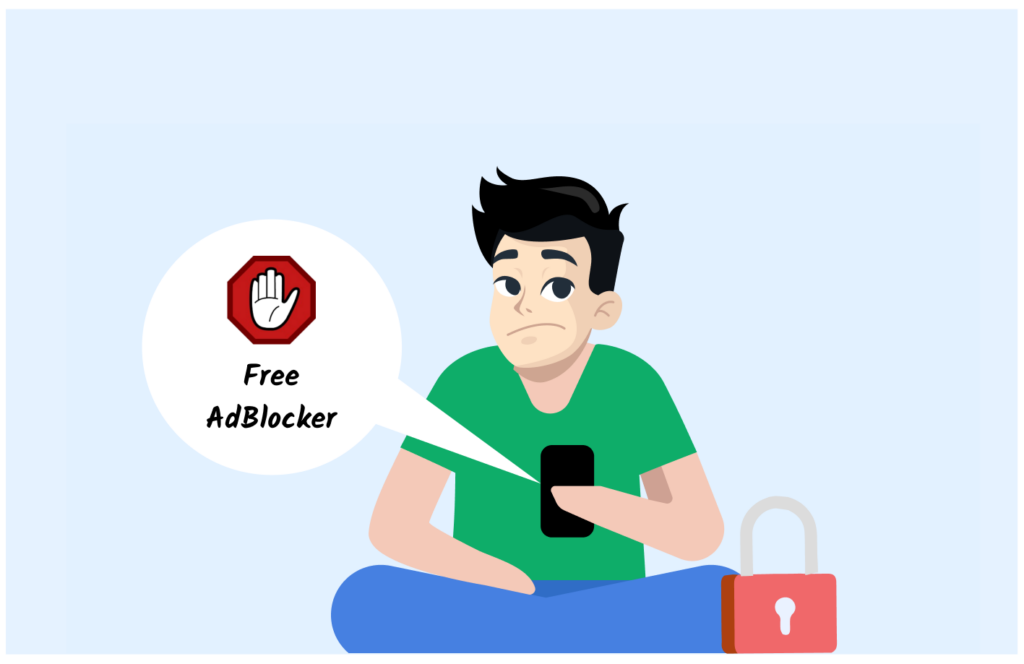
Many free ad blockers do not offer the kind of quality available from premium ad blockers, even if they’re seemingly reliable. As a result, free ad blockers are not safe compared to paid versions.
A major difference between these tools is their level of effectiveness when blocking ads. Many tests have shown that paid ad blockers are more effective than free versions.
In addition, not all free ad blockers support customization options and white listing of websites and services. Free ad blockers do not often contribute to an improved browsing experience because they tend to take more resources and increase load times. Also, they are not compatible with every device.
Free ad blockers may limit the number of devices they can protect, in contrast to paid versions that often support multiple devices. Most free versions do not come with any extra features like password managers, parental control, or VPNs.
Who are free ad blockers for?
When you choose an ad blocker at random, it could either be a paid platform with different payment packages or it could be free. Ideally, both free and paid ad blockers are effective in blocking persistent ads, but who are the free ad blockers for? Let’s look a little closer.
The main purpose of free ad blockers is the ability to remove basic ads and make it impossible to track user data. With the free tool, you can effectively eliminate basic ads, stop cookies, and prevent third-party tracking. You can also get rid of adware that may be embedded in your webpage with built-in ad-blocking features, which are common with modern Web browsers.
If you want more advanced features and even more robust protection against intruding ads, you may need to subscribe to a payment plan with a paid ad blocker.
Ad blockers to avoid
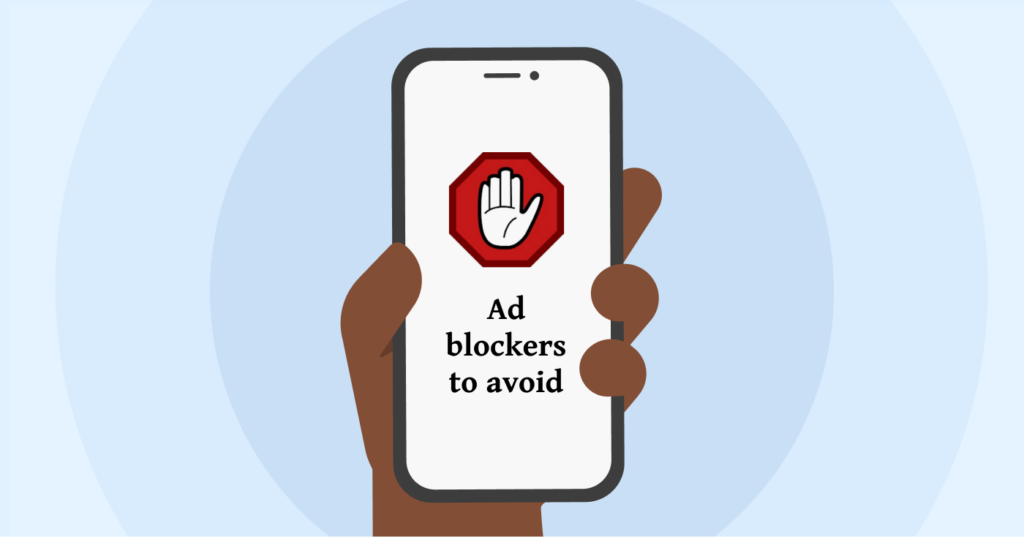
While there are many available ad blockers for use on the internet, not all of them are reliable. Consequently, they didn’t make our list. Since it’s easy to get lost in a pool of options, here are some ad blockers to avoid completely.
- Privacy Badger: The developers of Privacy Badger have been unable to deny the accusations of profiting off third-party data acquisitions. Privacy Badger does not effectively block modern ads and only does so well with trackers. So, you may want to consider other options when searching for ad blockers.
- uBlock: In our detailed list, we listed uBlock Origin as a great ad blocker to consider, but it is completely different from uBlock. This adblocker has been known to modify cookies and personal settings to allow websites to track their users subtly.
Why do websites and other platforms show ads?

While ads can be really frustrating for users, they are a necessary evil for businesses looking to generate revenue. By displaying online ads, businesses can pay for important expenses like fees for web hosting, developer’s compensation, writer’s fees, etc.
Brands and website owners are in the business of making money while providing content for regular visitors. One of the most common ways to achieve this is by advertising products and services of several businesses to targeted audiences.
Online advertisements also help businesses remind customers of important products and services that may be valuable to them. However, it can become a nuisance from the user’s perspective; a reliable ad blocker always comes in handy.
Is it ethical to block ads?
The answer to whether ad blocking is ethical or not is not clear. This is because people block ads for various reasons. Similarly, people run ads for a bunch of reasons, too, so this answer is solely based on individual perspectives.
Online adverts are an essential component of the internet, keeping it free from hidden fees and other monetization strategies. Specifically, selling ads on websites enables independent creators and companies to earn a living. For this reason, ad blocking might be considered unethical because it could deprive people of their livelihoods.
On the other hand, there is a need for ad blockers to improve the overall internet experience because some ads can be distracting. Fraudsters often use online ads to spread malware or encourage scams, and anyone can fall victim.
Troubleshooting tips when using an ad blocker
To ensure that you do not encounter problems with your adblocker, it is important to pay close attention during the installation process. Most ad blockers often come with instructions that must be strictly followed for a seamless experience. After installation, your ad blocker icon should appear on your toolbar. If not, you may need to search through the extensions installed on your device.
When browsing through a site requesting to turn off adblock, you can allowlist the website if you trust its contents. Depending on the ad blocker you use, you can also filter any ads you want to see.
FAQs
Absolutely! Opting for the right ad blocker can put an end to disruptive ads when browsing the internet. Seeing as ad blockers work on the DNS level, they stop harmful viruses and persistent ads even before they can load up on your screen.
Yes, many modern ad blockers protect against harmful viruses. However, they are not as effective in getting rid of viruses or malware as an antivirus. Ad blockers like Total Adblock provide extra value by including anti-malware software to protect you against virus attacks while surfing.
After testing and reviewing numerous ad blockers, a fan favorite that we can stand behind that offers numerous features, is easy to use, and is compatible with most devices is NordVPN Threat Protection. It has proven to be efficient in blocking ads and will keep you anonymous using its VPN when browsing.
Yes, they do. To modify your web pages and block harmful content effectively, ad blockers are given access to sensitive data. That’s why choosing an ad blocker that adheres to a no-logs policy is recommended. We suggest NordVPN threat Protection as it follows its no-logs policy strictly.




